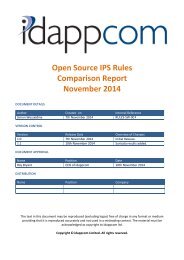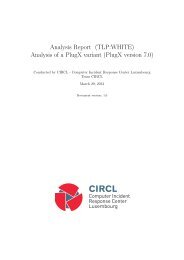The use of the Internet
The use of the Internet
The use of the Internet
You also want an ePaper? Increase the reach of your titles
YUMPU automatically turns print PDFs into web optimized ePapers that Google loves.
18<br />
THE USE OF THE INTERNET FOR TERRORIST PURPOSES<br />
Member States to become parties to <strong>the</strong> universal counter-terrorism legal instruments,<br />
<strong>the</strong> rate <strong>of</strong> adherence to <strong>the</strong>se instruments has increased significantly. As at June 2011,<br />
two thirds <strong>of</strong> Member States had ei<strong>the</strong>r ratified or acceded to at least 10 <strong>of</strong> <strong>the</strong> 16<br />
universal counter-terrorism instruments. 38<br />
49. <strong>The</strong>re is currently no comprehensive United Nations treaty on terrorism that is<br />
applicable to an exhaustive list <strong>of</strong> <strong>the</strong> manifestations <strong>of</strong> terrorism. Similarly, <strong>the</strong> international<br />
community has yet to agree on an internationally binding definition <strong>of</strong> <strong>the</strong><br />
term “terrorism”, 39 owing largely to <strong>the</strong> difficulty <strong>of</strong> devising a universally acceptable<br />
legal categorization for acts <strong>of</strong> violence committed by States, by armed groups such as<br />
liberation or self-determination movements or by individuals.<br />
50. Member States have been engaged since 2000 in negotiations relating to a comprehensive<br />
counter-terrorism convention, which will ultimately include a definition <strong>of</strong><br />
terrorism. Faced, however, with <strong>the</strong> difficulty <strong>of</strong> reaching consensus on a single, globally<br />
accepted definition <strong>of</strong> what constitutes terrorism, progress has instead been made<br />
through <strong>the</strong> existing universal legal instruments, which have developed along sectoral<br />
lines. <strong>The</strong>se instruments focus on criminalizing specific “terrorist acts” without defining<br />
<strong>the</strong> broader concept <strong>of</strong> terrorism.<br />
51. <strong>The</strong> universal instruments do not define terrorist <strong>of</strong>fences as crimes under international<br />
law. Ra<strong>the</strong>r, <strong>the</strong>y create an obligation for States parties to <strong>the</strong> agreements to<br />
criminalize <strong>the</strong> specified unlawful conduct under <strong>the</strong>ir domestic law, exercise jurisdiction<br />
over <strong>of</strong>fenders under prescribed conditions and provide for international cooperation<br />
mechanisms that enable States parties to ei<strong>the</strong>r prosecute or extradite <strong>the</strong> alleged <strong>of</strong>fenders.<br />
Until <strong>the</strong> successful conclusion <strong>of</strong> ongoing negotiations on a universal definition<br />
or comprehensive convention relating to terrorism, bilateral and multilateral agreements<br />
should provide <strong>the</strong> basis for <strong>the</strong> development <strong>of</strong> common standards to counter <strong>the</strong> <strong>use</strong><br />
<strong>of</strong> <strong>the</strong> <strong>Internet</strong> for terrorist purposes, in <strong>the</strong> interest <strong>of</strong> promoting international<br />
cooperation.<br />
52. No universal convention has been adopted specifically relating to <strong>the</strong> prevention<br />
and suppression <strong>of</strong> terrorist <strong>use</strong> <strong>of</strong> <strong>the</strong> <strong>Internet</strong>. In December 2010, <strong>the</strong> General Assembly<br />
adopted resolution 65/230, in which it, inter alia, endorsed <strong>the</strong> Salvador Declaration<br />
on Comprehensive Strategies for Global Challenges: Crime Prevention and Criminal<br />
Justice Systems and <strong>The</strong>ir Development in a Changing World 40 and requested <strong>the</strong> Commission<br />
on Crime Prevention and Criminal Justice to establish, in line with <strong>the</strong> Salvador<br />
Declaration, an open-ended intergovernmental expert group to conduct a<br />
38 See www.un.org/en/sc/ctc/laws.html.<br />
39 It is worth noting, however, that a recent decision by <strong>the</strong> Special Tribunal for Lebanon held that <strong>the</strong>re was sufficient<br />
evidence to support <strong>the</strong> existence <strong>of</strong> a definition <strong>of</strong> <strong>the</strong> crime <strong>of</strong> terrorism under customary international law.<br />
See Interlocutory Decision on <strong>the</strong> Applicable Law: Terrorism, Conspiracy, Homicide, Perpetration, Cumulative Charging,<br />
Case No. STL-11-01/I, Special Tribunal for Lebanon (16 February 2011); available from www.stl-tsl.org/en/<strong>the</strong>-cases/<br />
stl-11-01/rule-176bis/filings/orders-and-decisions/appeals-chamber/<br />
interlocutory-decision-on-<strong>the</strong>-applicable-law-terrorism-conspiracy-homicide-perpetration-cumulative-charging.<br />
40 Adopted by <strong>the</strong> Twelfth United Nations Congress on Crime Prevention and Criminal Justice, held in Salvador,<br />
Brazil, from 12 to 19 April 2010, which addressed, inter alia, <strong>the</strong> need for Member States to consider ways <strong>of</strong> fighting<br />
new forms <strong>of</strong> crime, such as cybercrime.







